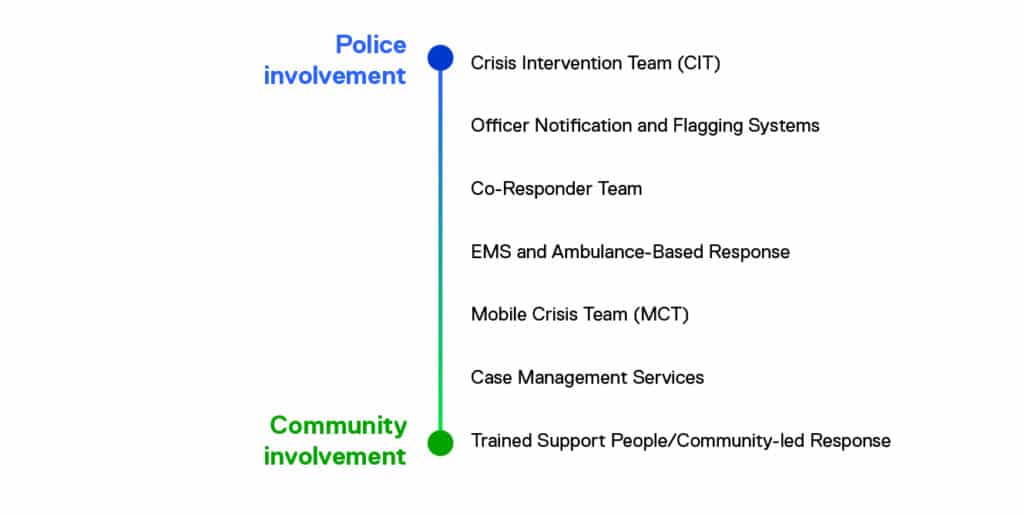A central place for critical information
While conducting research for the 2022 Public Safety Trends Report, I encountered many innovative programs established by municipalities to better meet their communities’ mental and behavioral health needs. Several newer programs emerged as a result of the “reimagine public safety” discourse that has flooded our news feeds since 2020. Other programs have been around for decades, quietly responding to the most vulnerable in their neighborhoods.
I wanted to learn more about the existing programs, so I scoured the internet and emailed various webinar speakers trying to get my hands on a comprehensive list of crisis response models across the U.S. With the launch of the 9-8-8 emergency mental health hotline quickly approaching, I thought such a resource must exist. To my surprise, consolidated crisis response model information is largely disparate, and lists are geographically limited. Having experienced a similar resource deficit while working in the anti-human trafficking space and observing how it crippled first responder efficiency, I saw an opportunity for Mark43 to fill this gap.
Thus, the Mark43 Crisis Response Directory was created as a collection of selected, publicly-available mental and behavioral health crisis response models from North America, Europe, and Australia. This regularly-updated directory is a repository of programs, though not exhaustive given the continued emergence of new response models in acknowledgement of evolving community needs.
Why crisis response?
Crisis response is a popular topic in public safety today. Though estimates vary, most studies find that 9-1-1 calls related to mental health concerns account for between four and ten percent of all calls for service. Despite comprising a low percentage of calls for service, the duration of mental health-related incidents far exceeds the time spent on other call types such as alarms, disorder, and follow-ups.
Mental health calls are time-consuming and potentially problematic for police officers who have less specialized training than a crisis specialist. Without proper training or lived experience, distress can look like non-compliance. Mental health issues, sometimes compounded by intellectual or developmental disabilities, make communication during a time of crisis extremely challenging. These circumstances may increase the likelihood of injury, arrest, or the use of force during a crisis event.
Recognition that police cannot be the appropriate first responder to every call has motivated communities to rethink their crisis responses. Though mental health challenges are ubiquitous, responses and solutions must be tailored to fit the unique needs of each community. These custom responses have resulted in a myriad of programs found in the Mark43 Crisis Response Directory.
Mark43’s Crisis Response Directory
The Mark43 Crisis Response Directory launches today with 100 programs across five countries that fall into seven model categories. These model categories group programs based on the type of responders and the program’s ability to reach individuals wherever their crisis is occurring. While specialized training is a critical component to effective crisis response, stand-alone training was not included as a model type in the Mark43 Crisis Response Directory. Technology-based responses such as mobile apps and notifications systems were excluded unless accompanied by physical response.
Though there are distinct categories, it is best to consider these models on a spectrum ranging from exclusive police involvement to strictly community-led responses. Because community needs are fluid, some municipalities deploy multiple response types to meet evolving mental and behavioral health demands.

As we enter the third year of the COVID-19 pandemic, we expect to see more emphasis on mental and behavioral health services around the world. These 100 programs barely scratch the surface of the existing crisis response work happening across the three continents. Mark43 will continue to expand the Mark43 Crisis Response Directory so it can serve as a robust resource for the purposes of increasing public awareness, improving first responder operations, and building community trust. If you know of a program not listed or wish to contribute one of your own, please contact us.

